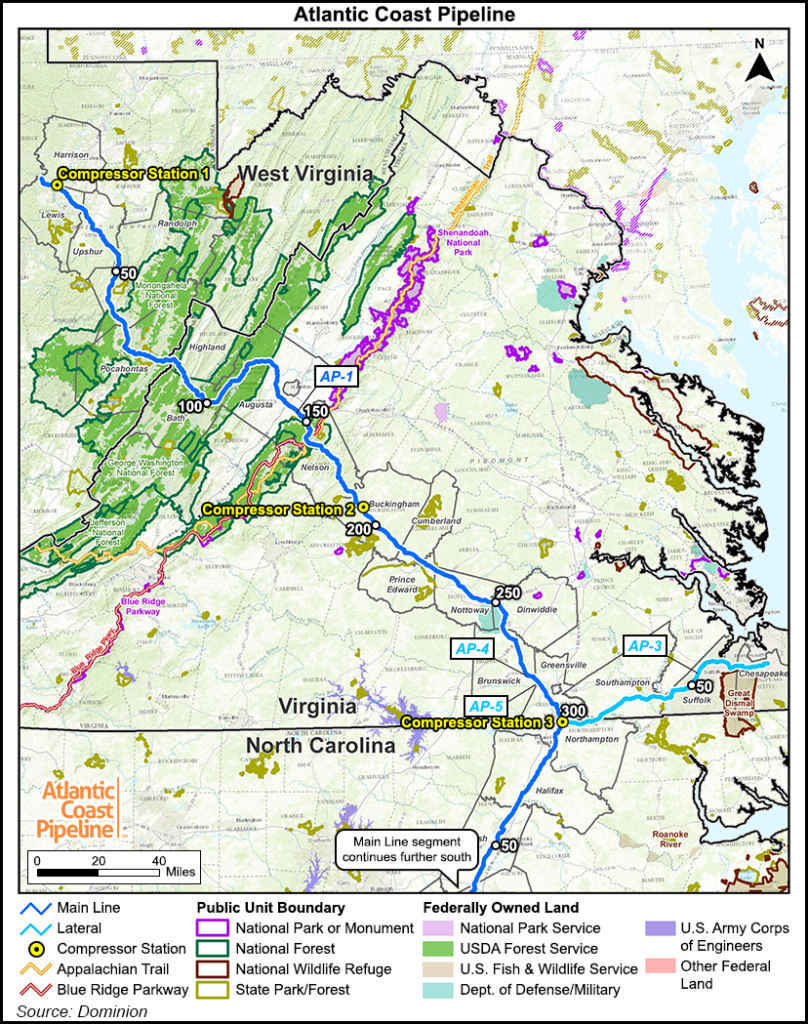Regulatory | Infrastructure | NGI All News Access
ACP Halts All Construction as Legal Challenges Mount
The Atlantic Coast Pipeline (ACP) has again stopped work after the U.S. Court of Appeals for the Fourth Circuit on Friday stayed the implementation of key federal authorizations that have already been reworked in response to ceaseless legal challenges by environmental groups led by the Sierra Club.

In a brief letter to the Federal Energy Regulatory Commission last week, ACP said it has stopped construction along the entire 600-mile route after the court’s latest decision except for “stand-down activities” for safety and the environment. Project spokesman Aaron Ruby added that the company “strongly” disagrees with the court’s latest decision.
The court stopped the implementation of ACP’s re-issued biological opinion and modified incidental take statement (ITS) in the latest legal snag. The move could further delay full service on the system beyond the mid-2020 guidance, according to analysts at ClearView Energy Partners LLC.
Work on the pipeline was temporarily stopped earlier this year when the Fourth Circuit first vacated the ITS issued under the Endangered Species Act. The permit is required for activities that could harm threatened wildlife.
The U.S. Fish and Wildlife Service (FWS) later revised the biological opinion and modified the ITS in response. But the Sierra Club argued that the agency pushed the process too quickly for political reasons, compounding risks for the Indiana Bat, the Clubshell Mussel, the Rusty Patched Bumble Bee and the Madison Cave Isopod. The court agreed to stay the reissued authorizations pending appeal.
“We believe FWS thoroughly addressed the issues raised by the court and the petitioners in this case when it reauthorized the project’s biological opinion and ITS in September,” Ruby said. “In developing this project over the last four years, we have taken extraordinary care to protect the sensitive species at issue in this case. We will vigorously defend the agency’s reauthorizations and the measures we’ve taken to protect the species in oral arguments before the court early next year.”
ACP has requested that the court narrow its latest order to the areas where the species are located to avoid stopping work for a prolonged period over the entire route, arguing that the stay is too broad.
“We do not believe there is any basis for the court to stay the entire biological opinion, which authorizes all 600 miles of the project,” Ruby said, adding that the work stoppage is only temporary as the company seeks more answers from the court. “The issues in this case involve a much narrower scope of the project — only four species and roughly 100 miles in West Virginia and Virginia. We will have more clarity on the scope of the court’s stay and its impact on the project when the court responds to our motion.”
But analysts see more challenges ahead for the project.
“Even if ACP’s motion to narrow the scope of the stay is granted and is limited to the forest service areas already subject to stay in a separate case, we see the probability that ACP will be unable to restart work in these areas until the fall/winter of 2019 to be growing,” ClearView said in a note to clients on Monday.
In the other case, the Southern Environmental Law Center and environmental groups, including the Sierra Club, want the Fourth Circuit to order the U.S. Forest Service to review alternatives to ACP’s route through the George Washington National Forest, a time-consuming possibility that would likely further delay the project, ClearView said.
ACP would carry 1.5 Bcf/d of Appalachian natural gas from West Virginia, through Virginia and North Carolina to Southeast markets. The project also was forced to voluntarily suspend water-crossing work along the entire route last month after the Fourth Circuit stayed its Nationwide Permit 12 pending the review of a challenge brought by the Sierra Club and others.
© 2024 Natural Gas Intelligence. All rights reserved.
ISSN © 1532-1231 | ISSN © 2577-9877 |
